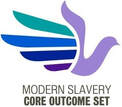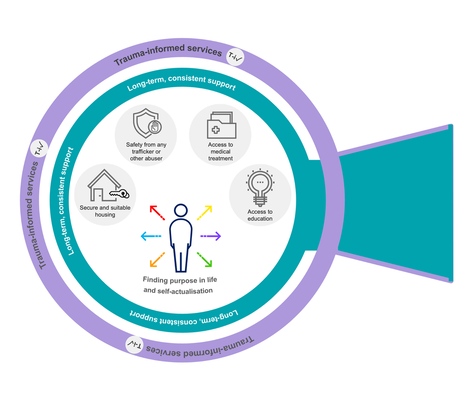"The MSCOS adopts a multi-level and holistic approach, encompassing outcomes across a variety of domains that have traditionally been segregated in interventions. Many different types of interventions have been developed to aid the recovery and reintegration of survivors, with some focussing on assisting survivors to address pragmatic issues post-trafficking, some on legal assistance, others on physical health, and others still on mental health exclusively. Across this variety of interventions, it is apparent that many of the outcomes and mechanisms of action that lead to improvement intersect and overlap. Inter-agency collaboration and integration should be an important focus in the development of any programme for the recovery, integration and wellbeing of survivors of modern slavery. The multi-level and holistic approach of the MSCOS intentionally steers us away from a framework in which we survivors are seen as solely responsible for achieving recovery, integration and wellbeing outcomes and moves us towards a framework that emphasises the important role that institutions and systems play."
Dr. Sharli Paphitis, Principle Investigator for the Modern Slavery Core Outcome (MSCOS) Project
Priority Recommendations from the MSCOS Study
- The MSCOS should be referred to as the minimum standard set of outcomes to be used in research, service and intervention design, evaluation and development, and policymaking. (Space these)
- Researchers, policymakers and service providers should use the MSCOS to think about interventions holistically. This means considering all MSCOS outcomes in intervention development and evaluation. If an intervention for survivors doesn't cover all the MSCOS outcomes, policymakers, researchers and service providers should either consider amending it or partnering with services or intervention that do. This will necessitate cross-departmental working in government and collaborations across NGOs,
- Researchers and service providers should use the MSCOS to think about interventions on many different levels, including the individual, organisational, governmental and societal levels. Service providers, researchers and policymakers should consider the importance of structural factors in intervention evaluations.
- Survivors need to be provided with secure and appropriate safe accommodation to support their recovery, wellbeing, and integration. Government providers should consider supporting the creation of survivor-managed safe houses.
- Professionals working with survivors should understand the key principles of relational ethics and use these to help build more meaningful, trusting relationships.
- Service providers and policymakers should acknowledge that access to medical treatment and education are structural issues. They should design interventions that address the structural racism and financial deprivation that many survivors endure.
- Service providers, policymakers and researchers should avoid thinking about survivor outcomes based on a linear short-term, medium-term and long-term progression. Rather, stakeholders should accept that needs and support can fade out and come back into relevance over many decades. Services should, therefore, be accessible at any time during a survivor’s life.
- Projects, services, evaluations, interventions and policymaking on human trafficking and modern slavery should involve survivors as early in the process as possible.
- Survivors should be appropriately compensated for participation in research, policy, or NGO work, and all financial information relating to any project with survivor involvement should be transparent.
You can download a copy of the MSCOS Final Project Report here.
| MSCOS Final Project Report | |
| File Size: | 1317 kb |
| File Type: | |
MSCOS Discussion Forums
|
PARTNERS
|
FUNDER
|















